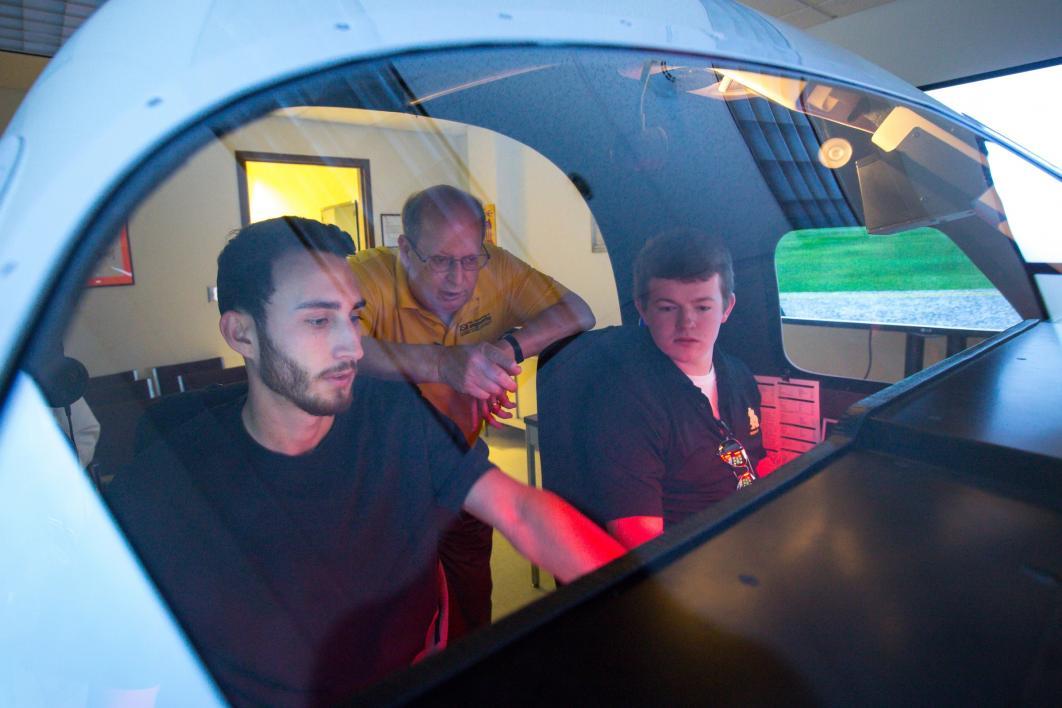Look! Up in the sky! It’s a bird! It’s a plane! It’s …
OK, maybe we don’t know what it is.
That seems to be the case being made by a group of Navy pilots regarding objects they witnessed while conducting training maneuvers off the East Coast of the U.S., from Virginia to Florida, in 2014 and 2015. The pilots recently shared their experiences in a New York Times report.
Though the article stated, “No one in the Defense Department is saying that the objects were extraterrestrial, and experts emphasize that earthly explanations can generally be found for such incidents,” it generated a lot of buzz around the internet and among the "We are not alone" crowd.
Taking a cue from 1990s television’s most beloved conspiracy theorist, intrepid if not paranoid "The X-Files" FBI agent Fox Mulder, one Reddit poster commented about the article, “Unidentified objects zipping around for 11 hours at unfathomable speeds … stopping … turning on a dime at 8k mph. There’s something out there. Sorry, folks. Time to accept that there are unknowns to our world.”
In search of whatever truths may be out there, ASU Now wrangled a few experts to get their take on the so-called inexplicable incidents described and why the subject is so fascinating to us Earthlings: psychology Assistant Professor Michael Varnum, aviation programs Faculty Associate Michael Hampshire and psychology Professor Michael McBeath.
(We looked into it, and we're 99.9% sure there's no evidence to support a conspiracy theory behind their identical forenames.)
Michael Varnum
Michael Varnum
Varnum uses insights from biology to help understand sources of cultural variation and causes of cultural change. He has conducted several studies that analyze language and emotion in reaction to potential extraterrestrial life discoveries, with the overwhelming finding being that reactions were significantly more positive than negative.
Question: Do psychologists have any idea why humans seem to be fascinated by unidentified flying objects and the possibility of extraterrestrial life?
Answer: My general sense is that it relates to the fact that humans are a highly curious species that is often driven by/fascinated with novelty. What could be more novel?
Q: Why do some people buy into the theory that UFOs are proof of alien life and some don’t?
A: I can't really speak too much to this, but it’s worth noting that back in the early 2000s Susan ClancySusan Clancy is a cognitive psychologist and associate professor in consumer behavior at INCAE Business School, as well as a postdoctoral fellow at Harvard University. She is best known for her controversial work on repressed and recovered memories in her books “Abducted” and “The Trauma Myth.” and colleagues showed that people who believe they have been abducted by aliens are more susceptible to false memories in controlled experimental settings. Although this may not speak directly to your question, I think it is a piece of the puzzle. It's also the case that people are susceptible to the confirmation bias, where we tend to seek out and believe information that supports our preexisting beliefs and ignore or discount evidence that contradicts them.
Why would people be more or less amenable to the ET hypothesis for UFOs to begin with? I'm not sure, but others have suggested that this belief and UFOlogy in general share many elements of a religious belief system. So it may be that the scientific veneer associated with the subject helps scratch that spiritual itch for folks who otherwise have a hard time believing in traditional religions. I also think the belief that UFOs are extraterrestrial in nature is appealing to many precisely because the mainstream scientific community rejects it. In essence, believing that we are being visited by aliens may help people feel like they hold some special or secret knowledge. It would be interesting to see what would happen if in fact there were definitive evidence of ET life. It might actually bum many of these folks out.
I also think that the UFO-as-ET hypothesis has been promoted by American military intelligence as a way to provide cover for the development of advanced aircraft, to spook our enemies and to study information transmission. This argument is compellingly advanced by Mark Pilkington in his fascinating book “Mirage Men,” which is worth a read.
Q: You analyzed media coverage about the possibility that the interstellar Oumuamua asteroid might actually be a spaceship and found evidence of more positive than negative reactions. Why do you think that is, as opposed to people reacting with fear?
A: My sense is that unless evidence of ET life were linked to a direct threat that we should not expect negative emotional reactions. This what a team of students and I, led by Yul Kwon, found in a series of studies focused mostly on reactions to microbial ET life among Americans. And in a pilot study conducted later and presented at AAAS, we did find evidence of more positive versus negative reactions in media coverage of the Oumuamua-as-spaceship hypothesis. More recently, when we asked large samples in five countries about how they would react to a hypothetical discovery of intelligent ET life, we saw the same pattern of more positive versus negative emotional responding.
I think that an announcement of ET life's discovery is something that would make us feel good for a number of reasons. It would be interesting, novel and, on a deeper level, might make the universe feel like a less lonely place. That said, of course if we discovered a hostile armada of alien warships heading toward Earth with the intent to destroy or conquer us, we probably would feel quite differently about it.
Michael Hampshire (center), ASU faculty associate with aviation programs at the Polytechnic School, looks on as students in the King Air 200 twin-engine simulator take part in an air navigation and airline instrument procedure class. Photo by Charlie Leight/ASU Now
Michael Hampshire
Hampshire is a U.S. Air Force veteran with decades of experience. He has served as an instructor and jumpmaster with the USAF Academy Parachute Team and as an instructor pilot and flight examiner for a variety of aircraft, including the Convair F-106 Delta Dart, the Northrop T-38 Talon and the F-4 Phantom, at Air Force bases from Minot to Tyndall to Williams to Clark Air Base in the Philippines. He has been with ASU since 2014 as a ground school and simulator instructor.
Q: What was your initial impression of the recent reports of UFOs?
A: It was interesting. They obviously saw something — but it’s a matter of what it is. You see unusual things all the time as a pilot. But one thing that was lacking that I didn’t see in any of their tapes was range info. They had info about direction, where things were going, but not how far away they were. Without that, you can’t be sure how large or how fast they are. Something that’s a long ways away moving in a certain track will be moving a lot faster than something close to you moving in that same track. So it’s hard to tell.
Q: Are the incidents reported in the article unprecedented or commonplace?
A: Things get reported all the time. For instance, a lot of pilots mistake Venus for another airplane. Venus is usually low on the horizon, so the refraction off the atmosphere causes it to flash red and green like an airplane. When I was in the Air Force, I was flying one night in Florida when the moon looked really strange. It came up really low so it looked a lot bigger because of the atmosphere. That night, somebody reported the moon as a UFO. So you see all kinds of things, but generally they become explainable. I’m a UFOs-from-other-planets skeptic because there are things you see that are fantastic but they usually have an explanation.
Q: Have you ever experienced a UFO?
A: Nothing that wasn’t explainable later on.
Q: In your experience, was there ever reason to be reluctant to report having seen a UFO?
A: You get stories that people are reluctant because the military might chastise them. I don’t believe that’s true. A lot of my time in the military was in the air defense. We were the ones who got launched on UFOs, to go check them out. And if you see something, you report it, no matter how fantastic it was. But not only did I never see one (that wasn’t able to be explained later), I never knew anyone who saw one, and I never heard from anyone who knew of anyone who saw one.
Q: Could you venture a guess as to what might be the explanation for the UFOs in the videos?
A: The military is working to make drones small enough that they can be deployed from an aircraft dispenser, be given a mission, go out and do the mission and then be recovered. They are well controlled, and they fly in patterns. One video I’ve seen of them looked very similar to what was on those tapes the Navy released. I’m not saying that’s what it was necessarily, but in the past, the military has put things up in the air that were correctly identified as UFOs because we didn’t know what they were at the time but they were later explained. When the (Lockheed) U-2The Lockheed U-2, nicknamed “Dragon Lady,” is an American single-jet engine, ultra-high altitude reconnaissance aircraft operated by the United States Air Force and previously flown by the Central Intelligence Agency. was first built, people would report seeing it and air traffic would tell them there was nothing there because they weren’t supposed to report it.
Q: Why would the military tell people they didn’t see something?
A: DARPA is constantly testing new things. That’s a lot of what goes on out in Area 51, is testing of new technologies. But if you don’t need to know about it, you won’t hear about it. You can fly through the area if you have to, and you can land there if you need to make an emergency landing, but you can expect an extensive debriefing on what you didn’t see.
Q: What do you think is the final takeaway?
A: I would think it’s a lot more likely that those videos are of some more advanced form of those drones than alien UFOs. If I was an alien, I probably wouldn’t want to hang out in the middle of the ocean; I’d probably want to go see Chicago or New York or something. I could be wrong — maybe we’re getting visited by aliens. But I don’t think so.
Michael McBeath
Michael McBeath
McBeath’s research focuses on the emerging field of combining psychology, engineering and perception-action. He uses computational modeling of perception-action in dynamic, natural environments, with specialties that span sports, robotics, music, navigation, animal behavior and multisensory object perception. He has worked as a research scientist at NASA’s Ames Research Center as well as the Interval Research Corporation, a technology think tank funded by Microsoft co-founder Paul Allen.
Q: What was your Initial impression of the recent reports of UFOs?
A: The recent reports in the news seemed really similar to some of the reports from the NASA scientists I used to meet with; these are people that are pretty deep in the military and they’re just saying, look, we have seen some weird things and it seems like we should be able to talk about it.
Q: Why might people be reluctant to report having seen a UFO?
A: There are two aspects of UFOs. One technically means “unidentified flying object.” Nothing at all spooky or woo-woo about it, just something up there and you don’t know what it is. And the other is the tendency of some people to say this is proof that aliens are here. There’s a valid reason to not be too encouraging of people believing in weird things because people can be taken advantage of and terrible things can happen. So in one sense, it’s better to err on the side of being conservative. But I actually think you could argue it’s just as unscientific for somebody to say it couldn’t possibly be extraterrestrial. A good scientist says it’s an unidentified flying object, and while there’s a low probability that it’s extraterrestrial, it’s still unknown. You don’t have to jump to conclusions that it is or isn’t extraterrestrial. It’s fine to say we don’t know.
Q: Do you think there’s any evidence to support extraterrestrial life visiting Earth?
A: There’s lots of people at NASA and physicists at Stanford and elsewhere that are sympathetic to the idea that other life forms have a decent chance of existing somewhere in the universe. But it seems there’s not really good evidence that we’ve seen that proves that they’re here, and if they were, it would involve some really not well-understood physics to travel those long distances.
Q: You study perceptual distortions and illusions. Could that be what’s behind UFO sightings? Are people just seeing things that aren’t there, or confusing them for something else?
A: This is part of what makes this a really interesting and difficult problem. That’s certainly what’s happening some of the time. How do you know when it’s a hallucination versus when it’s real? I’ve done some research on baseball pitches, and there almost certainly has to be an illusion in how people see the ball trajectory coming at them, which has a lot to do with all the weird things that a ball can do. Knuckleballs change directions; curveballs curve in weird ways. So how do you figure out how much of that is an illusion and how much is actual ball trajectory? We know that sometimes there are weird illusions, like ball lightning, but sometimes there are things the government doesn’t want to fess up to, like the stealth bomber. We also know that people sometimes do hallucinate.
Q: Is there a chance there’s something out there, regardless of its origins, that we can’t perceive?
A: A lot of my research looks at the idea that there’s tons of energy information out there and what we as humans have evolved to process efficiently isn’t everything that can be observed. Humans only have three cone types in our vision, so we don’t see all of the visual energies, but our eyes compress it in a way that works well for us. We also don’t hear all frequencies; infrasound and ultrasound are lower and higher than our hearing range. But we hear well enough to react to most things that are important to us in our environment. So we’re constantly discovering things. Turns out elephants have a lot more sophisticated vocal patterns than we thought; we just couldn’t differentiate them because they were outside of our hearing range. The same is true with mice. The New York Times report mentioned that the pilots had used radar to lock onto some of the objects because they were beyond human visual capabilities. So it might be an interesting time now that we’re getting more advanced equipment.
Q: What do you think is the final takeaway?
A: At the end of the day, it looks like there are some sophisticated people in the government who have measured some things that are unidentifiable. Whether they’re extraterrestrial or other countries’ technology or some genius kid figured out something, we can’t say for sure now. But if something like this inspires people to want to study it more, that’s a good thing.
Top illustration by Getty Images/iStockphoto
More Science and technology

How AI is changing college
Artificial intelligence is the “great equalizer,” in the words of ASU President Michael Crow.It’s compelled industries, including higher education, to adapt quickly to keep pace with its rapid…

The Dreamscape effect
Written by Bret HovellSeventh grader Samuel Granado is a well-spoken and bright student at Villa de Paz Elementary School in Phoenix. But he starts out cautiously when he describes a new virtual…

Research expenditures ranking underscores ASU’s dramatic growth in high-impact science
Arizona State University has surpassed $1 billion in annual research funding for the first time, placing the university among the top 4% of research institutions nationwide, according to the latest…



